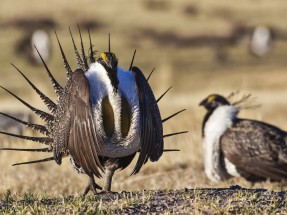On the front cover of Ecology & Evolution
2019-08-08

Fire is an important component in many ecosystems and has an increasing impact on wildlife due to global environmental change and anthropogenic activities. Our new study (https://doi.org/10.1002/ece3.5432) shows that unburned islands within fire habitats can reduce the negative effects of fire on wildlife and therefore help species to survive in such ecosystems. We studied the post-fire population responses of the greater sage-grouse, a large ground-living bird that inhabits the fire-prone sagebrush ecosystems of North America, and found that the greater sage-grouse populations were negatively affected by fire events, but that unburned islands showed stable or increasing population trends for this species. This suggests that unburned islands act as fire refugia by providing habitat in which species can survive and recolonize burned areas. The study has been highlighted on the front cover of the journal Ecology & Evolution. The publication is available here, and a public news item here.


